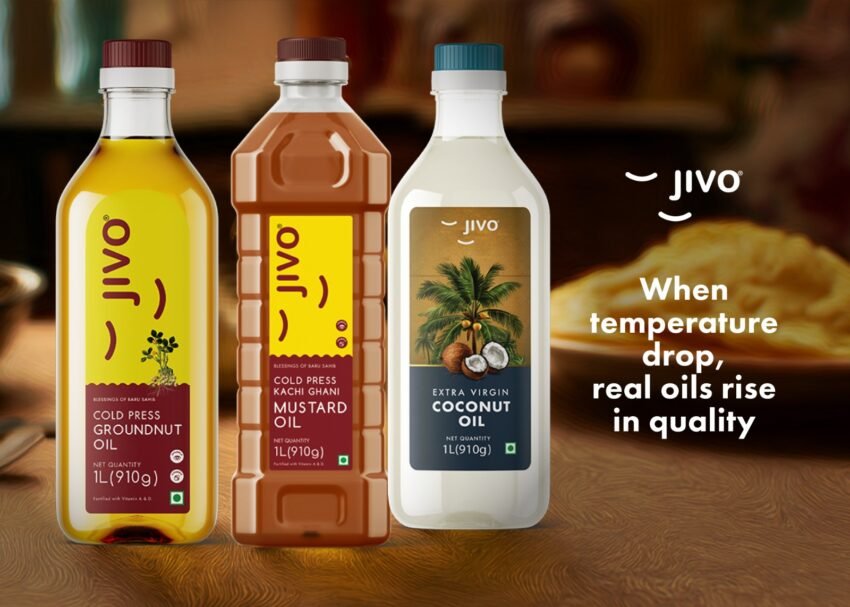Every winter, choosing the best cold-pressed oils to use in winter becomes a priority for health-conscious Indian kitchens. If you live in Delhi, Punjab, Haryana, or any part of North India where temperatures drop below 15°C, you’ve likely noticed your cooking oil turning thick, cloudy, or even completely solid like ghee during the colder months. This change often causes worry—has the oil gone bad? Should it be discarded? Is it still safe for your family?
The good news is that this transformation is completely natural. When pure, unrefined oils solidify in winter, it actually proves their purity and quality. Oils like mustard, groundnut, and extra virgin olive oil are known to behave this way, especially in cold weather. So instead of panic, cook with confidence this winter, knowing that your solidified oil remains safe, nutritious, and healthy for all your favourite Indian dishes. Choosing the best cooking oils in India ensures you get purity, flavour, and health benefits in every meal.
Which cooking oils may become unhealthy or lose quality after solidifying or freezing?
The simple answer stands at none. No pure cooking oil turns unhealthy just because it becomes solid or freezes in cold weather. This is only a physical change, just like water turning into ice. When temperature drops, oils rich in good fats start crystallizing and become thick or hard. Nothing harmful forms inside. Many families worry that freezing creates toxins or spoils nutrients. Scientific studies from food research centers clearly show that single freezing or natural winter solidification does not create any dangerous compounds. Repeatedly freezing and thawing the same oil many times might cause slight cloudiness in some unrefined oils, but even then, it stays safe to eat. The real enemies of oil remain heat, light and air that cause rancidity over months. Cold weather actually protects oil longer. So, feel relaxed, your solidified oil is as good as new among healthy cold pressed oils.
Do cold pressed oils freeze in winter, and are they safe to use after?
Yes, pure cold pressed oils often freeze or become semi solid in winter, especially in North Indian homes where nights get really chilly. This happens because cold pressing keeps all natural fats and waxes intact without any chemical refining. Refined oils stay liquid because companies remove those natural parts to prevent solidification. When your kachi ghani cold pressed mustard or groundnut oil turns solid, it actually shows that you bought genuine stuff. After it warms up again, the oil returns exactly to its original form with full flavour and nutrition. Families across Punjab and Rajasthan have used such oils for generations without any harm. Nutrition experts say these oils stay among the best cooking oils in India because cold preserves vitamins and antioxidants better. Just warm the bottle gently in sunlight or lukewarm water and use happily. Your family gets the same health benefits as always from these best cold pressed oils in India.
Why Freezing Does Not Make Oils Unhealthy
Many myths float around WhatsApp groups that frozen oil becomes toxic or loses goodness. Let us clear this with simple facts. Oil contains different types of fats. Some fats stay liquid even in cold while others harden fast. Coconut oil solidifies even at room temperature, mustard oil thickens below ten degrees and pure olive oil clouds in the fridge. This is nature’s way, not damage. Some studies explain that freezing slows down oxidation, the process that actually makes oil rancid and harmful over time. Commercial oil makers even freeze premium oils to keep them fresh longer. Studies on extra virgin olive oil show that after freezing and thawing gently, polyphenols and healthy compounds remain almost the same. If oil smells bad after warming, it was already old before winter arrived. So, freezing never creates poison. It protects your oil and keeps it among healthy cold pressed oils ready for tasty winter meals.
Which cold pressed oils are best for winter use even after solidifying, and why?
Winter demands oils that give warmth, fight dryness and keep joints flexible. Traditional Indian wisdom and modern nutrition both point towards a few champions that shine even brighter when they solidify.
Mustard oil tops the list as the best winter oil for cooking in India because its pungent warmth clears chest congestion and boosts circulation.
Groundnut oil comes next with its sweet nutty taste perfect for frying pooris and making halwa.
Coconut oil behaves like desi ghee in cold and provides quick energy through medium chain fats.
Sesame oil brings deep nourishment and protects skin from harsh winds.
These oils solidify naturally yet return perfectly when warmed. They carry more monounsaturated fats that stay stable and give body heat. Families in villages have trusted these for centuries during foggy mornings and chilly evenings. Choosing such best cold pressed oils in India means better immunity, glowing skin and delicious food throughout the season.
Also read: Why Choose Cold-Pressed Mustard Oil? 10 Health Benefits You Should Know
Best ways to use cold pressed oils specifically for cooking in winter
Winter cooking becomes joyful when you know small tricks to handle solidified oils.
- Keep the bottle near the stove for ten minutes and watch it melt just enough to pour.
- For coconut oil, scoop directly like butter and drop into hot kadhai where it melts instantly.
- Start every sabzi with hot mustard oil tadka containing garlic and ajwain for instant warmth and digestion boost.
- Use groundnut oil for deep frying festive mathris and gujiyas because its high smoke point keeps food crispy without absorbing extra oil.
- Make til laddoo with sesame oil for natural sweetness and bone strength. Drizzle warm extra virgin olive oil over hot soups for antioxidant punch.
- Rotate two or three oils every week so the family gets balanced nutrition.
- Always heat oil properly till it releases aroma before adding spices.
These simple habits turn ordinary meals into nourishing delights and make your kitchen proud of using the best cooking oils in India during the cold months.
Jivo: Leading Cold-Pressed Oil Brand in India
Jivo is one of the largest sellers of cold-pressed canola oil in India, holding around 80% of the market share with a vast distributor network reaching every corner of the country. Known for its commitment to purity and health, Jivo sources only natural, chemical-free oils that retain their nutrients through cold pressing. With trusted quality and wide availability, Jivo has become a household name for those seeking healthy cooking oils.
Best Cold-Pressed Oils by Jivo for Winter Cooking
Jivo Kachi Ghani Mustard Oil
This oil is rich in monounsaturated and polyunsaturated fats, including omega-3 and omega-6 fatty acids, with a strong natural aroma ideal for winter cooking. The mustard oil’s warming properties help improve blood circulation and digestion, which are particularly beneficial during cold months. Cold-pressed kachi ghani mustard oil has high antioxidant content protects the body from seasonal illnesses and supports heart health.
Jivo Cold-Pressed Groundnut Oil
Known for its mild sweetness and light texture, Jivo’s groundnut oil has a balanced fat profile with a good mix of monounsaturated fats and vitamin E. It stays light on the stomach while providing essential nutrients. Cold-pressed groundnut oil is perfect for traditional Gujarati undhiyu or Rajasthani sweets and offers gentle warmth and energy, making it suitable for winter diets.
Jivo Extra Virgin Coconut Oil
Cold-pressed coconut oil from Jivo is rich in medium-chain triglycerides (MCTs) and saturated fats that provide natural warmth and quick energy. Its antimicrobial and immune-boosting properties guard against winter infections, while its natural solidification at low temperatures assures purity. Extra virgin coconut oil is ideal for sautéing or drizzling on warm Indian meals, it enhances flavour and promotes healthy skin and digestion in winter.
Families trust Jivo for delivering pure cold-pressed oils that solidify visibly in winter, a sign of their natural goodness. Supported by nutritionists and doctors, these oils offer heart-friendly fats and essential nutrients for healthy, tasty winter cooking.
FAQs
Is it safe to use cooking oil after it turns solid in winter?
Yes, solidification in winter is natural and shows the oil’s purity. It remains safe and nutritious to use.
Do cold-pressed oils freeze in winter?
Yes, cold-pressed oils can freeze or become semi-solid due to natural fats. Thaw gently to retain quality.
Does freezing make cooking oil unhealthy?
No, freezing is a physical change and does not harm oil. Heat, light, and air are bigger risks for rancidity.
Which oils are best for winter cooking?
Mustard, groundnut, coconut, and sesame oils are great for winter due to warming properties and stable fats.
How to store oils in winter?
Store in cool, dark places and avoid frequent temperature changes to preserve freshness.
Can all oils solidify in winter?
Oils high in saturated and monounsaturated fats like mustard and coconut naturally solidify; refined oils less so.
Are cold-pressed oils healthier in winter?
Yes, cold-pressed oils retain antioxidants and nutrients better, supporting heart health and immunity during cold months.
Which ghee is best in India?
A2 cow ghee and desi ghee, both are best for their rich nutrition and traditional purity. While desi ghee offers authentic taste and nourishment, A2 cow ghee is easier to digest and packed with vitamins that boost immunity and support overall health.
Conclusion
This winter, let the solidified bottle of oil bring a smile, not worry. Pure cold-pressed oils turning thick or hard in cold weather prove they come from nature’s best, without any artificial tampering. From traditional kachi ghani mustard to modern cold-pressed groundnut and coconut oils, these natural treasures remain safe and preserve their nutrients better in low temperatures. Choose the best winter cooking oils in India that suit your taste and keep your family warm, energetic, and healthy. Jivo cold-pressed oils, trusted for their purity and nutrient-rich quality, make winter cooking easy and healthy across India. Cook with confidence, enjoy every meal, and celebrate the season with wholesome dishes made in Jivo—the best cold-pressed oils for winter kitchens.


1 thought on “Is It Safe to Use Cooking Oil After It Turns Solid in Winter?”